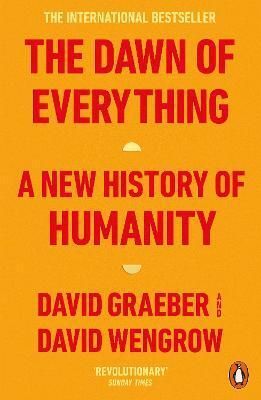David Wengrow
autor
The Dawn of Everything
For generations, our remote ancestors have been cast as primitive and childlike - either free and equal, or thuggish and warlike. Civilization, we are told, could be achieved only by sacrificing those original freedoms or, alternatively, by taming our baser instincts. David Graeber and David Wengrow show how such theories first emerged in the eighteenth century as a reaction to indigenous critiques of European society, and why they are wrong. In doing so, they overturn our view of human history, including the origins of farming, property, cities, democracy, slavery and civilization itself.
Drawing on path-breaking research in archaeology and anthropology, the authors show how history becomes a far more interesting place once we begin to see what's really there. If humans did not spend 95 per cent of their evolutionary past in tiny bands of hunter-gatherers, what were they doing all that time? If agriculture, and cities, did not mean a plunge into hierarchy and domination, then what kinds of social and economic organization did they lead to? The answers are often unexpected, and suggest that the course of history may be less set in stone, and more full of playful possibilities than we tend to assume.
The Dawn of Everything fundamentally transforms our understanding of the human past and offers a path toward imagining new forms of freedom, new ways of organizing society. This is a monumental book of formidable intellectual range, animated by curiosity, moral vision and faith in the power of direct action.
Počiatok všetkého. Nová história ľudstva
Úplne nový a revolučný pohľad na evolúciu ľudstva, ktorý našim predkom vracia dlho popieranú ľudskosť. Na základe najnovších výskumov antropológ David Graeber a archeológ David Wengrow radikálne prehodnotili dejiny človeka od samých počiatkov v časoch lovcov a zberačov, cez vznik poľnohospodárstva, prvých miest a štátov. Dokazujú, že naši predkovia boli inteligentní ľudia, ktorí sa nehnali len za potravou ani sa bezhlavo navzájom nezabíjali.
Ako teda trávili čas? Akí boli, čo robili, ako fungovali dávnoveké spoločnosti, dodnes považované za primitívne a jednoduché, hoci najnovšie poznatky ukazujú, že to tak nebolo?
Počiatok všetkého je dôkladná štúdia dvoch naslovovzatých odborníkov a nadšencov, ktorí našli odpovede na všetky tieto otázky.
dostupné aj ako:
Úsvit všeho
LOVCI A SBĚRAČI BYLI ORGANIZOVANĚJŠÍ, NEŽ SI MYSLÍTE.
A NĚKTERÁ Z PRVNÍCH MĚST SVOBODNĚJŠÍ, NEŽ BY VÁS NAPADLO.
Dlouhé tisíce let jsme údajně žili v absolutně rovnostářských kmenech – než jsme vynalezli zemědělství a s ním také bohatství a chudobu, byrokracii a krutovládce. Učitelé dějepisu i autoři bestsellerů o historii tento jednoduchý příběh milují. Profesoři David Graeber a David Wengrow nyní však na spoustě příkladů dokládají, že jde o pouhý výmysl. A že skutečnost byla nesrovnatelně zajímavější a rozmanitější, než nás učili ve školních lavicích.
Kniha Úsvit všeho stojí na přesvědčivých, ale dosud často opomíjených faktech z oblasti archeologie, historie a kulturní antropologie. Okamžitě se v těchto oborech stala světovou událostí a vyvolala diskuse, které budou probíhat ještě dlouhá léta.
AUTOŘI OŽIVUJÍ FASCINUJÍCÍ SVĚT, V NĚMŽ:
- Naši dávní předci nebyli primitivové žijící v tlupách, ale aktivní členové pozoruhodných, malých i velkých společností.
- První města na světě nezakládali zemědělci, nýbrž lovci a sběrači. Mimo jiné na území dnešní Ukrajiny.
- Příchod zemědělství nebyl žádnou revolucí – trval tisíce let a některé společnosti se od něj opět odvracely.
- Archeologie zmapovala obrovská města, která se obešla bez byrokracie, šlechty i tyranů.
- Lidé odpradávna experimentovali s různými podobami demokracie a své rozhodovací systémy svižně přizpůsobovali okolnostem.
Graeber a Wengrow nevolají po návratu na stromy. Na základě průkop- nických poznatků a archeologických objevů z celého světa nám však při- pomínají, že civilizaci můžeme budovat i bez toho, že bychom se vzdávali svých svobod.
dostupné aj ako:
Úsvit všeho
Lovci a sběrači byli organizovanější, než si myslíte.
A některá z prvních měst svobodnější, než by vás napadlo
Dlouhé tisíce let jsme údajně žili v absolutně rovnostářských kmenech – než jsme vynalezli zemědělství a s ním také bohatství a chudobu, byrokracii a krutovládce. Učitelé dějepisu i autoři bestsellerů o historii tento jednoduchý příběh milují. Profesoři David Graeber a David Wengrow nyní však na spoustě příkladů dokládají, že jde o pouhý výmysl. A že skutečnost byla nesrovnatelně zajímavější a rozmanitější, než nás učili ve školních lavicích.
Kniha Úsvit všeho stojí na přesvědčivých, ale dosud často opomíjených faktech z oblasti archeologie, historie a kulturní antropologie. Okamžitě se v těchto oborech stala světovou událostí a vyvolala diskuse, které budou probíhat ještě dlouhá léta.
Autoři oživují fascinujíci svět, v němž:
- Naši dávní předci nebyli primitivové žijící v tlupách, ale aktivní členové pozoruhodných, malých i velkých společností.
- První města na světě nezakládali zemědělci, nýbrž lovci a sběrači. Mimo jiné na území dnešní Ukrajiny.
- Příchod zemědělství nebyl žádnou revolucí – trval tisíce let a některé společnosti se od něj opět odvracely.
- Archeologie zmapovala obrovská města, která se obešla bez byrokracie, šlechty i tyranů.
- Lidé odpradávna experimentovali s různými podobami demokracie a své rozhodovací systémy svižně přizpůsobovali okolnostem.
Graeber a Wengrow nevolají po návratu na stromy. Na základě průkop- nických poznatků a archeologických objevů z celého světa nám však při- pomínají, že civilizaci můžeme budovat i bez toho, že bychom se vzdávali svých svobod.
Na stiahnutie
21,45 €
dostupné aj ako:
The Dawn of Everything
For generations, our remote ancestors have been cast as primitive and childlike - either free and equal, or thuggish and warlike. Civilization, we are told, could be achieved only by sacrificing those original freedoms or, alternatively, by taming our baser instincts. David Graeber and David Wengrow show how such theories first emerged in the eighteenth century as a reaction to indigenous critiques of European society, and why they are wrong. In doing so, they overturn our view of human history, including the origins of farming, property, cities, democracy, slavery and civilization itself.
Drawing on path-breaking research in archaeology and anthropology, the authors show how history becomes a far more interesting place once we begin to see what's really there. If humans did not spend 95 per cent of their evolutionary past in tiny bands of hunter-gatherers, what were they doing all that time? If agriculture, and cities, did not mean a plunge into hierarchy and domination, then what kinds of social and economic organization did they lead to? The answers are often unexpected, and suggest that the course of history may be less set in stone, and more full of playful possibilities than we tend to assume.
The Dawn of Everything fundamentally transforms our understanding of the human past and offers a path toward imagining new forms of freedom, new ways of organizing society. This is a monumental book of formidable intellectual range, animated by curiosity, moral vision and faith in the power of direct action.
'Fascinating, thought-provoking, groundbreaking. A book that will generate debate for years to come' Rutger Bregman
'Pacey and potentially revolutionary' Sunday Times
'Iconoclastic and irreverent ... an exhilarating read' The Guardian
'Boldly ambitious, entertaining and thought-provoking' Observer
'This is not a book. This is an intellectual feast' Nassim Nicholas Taleb










